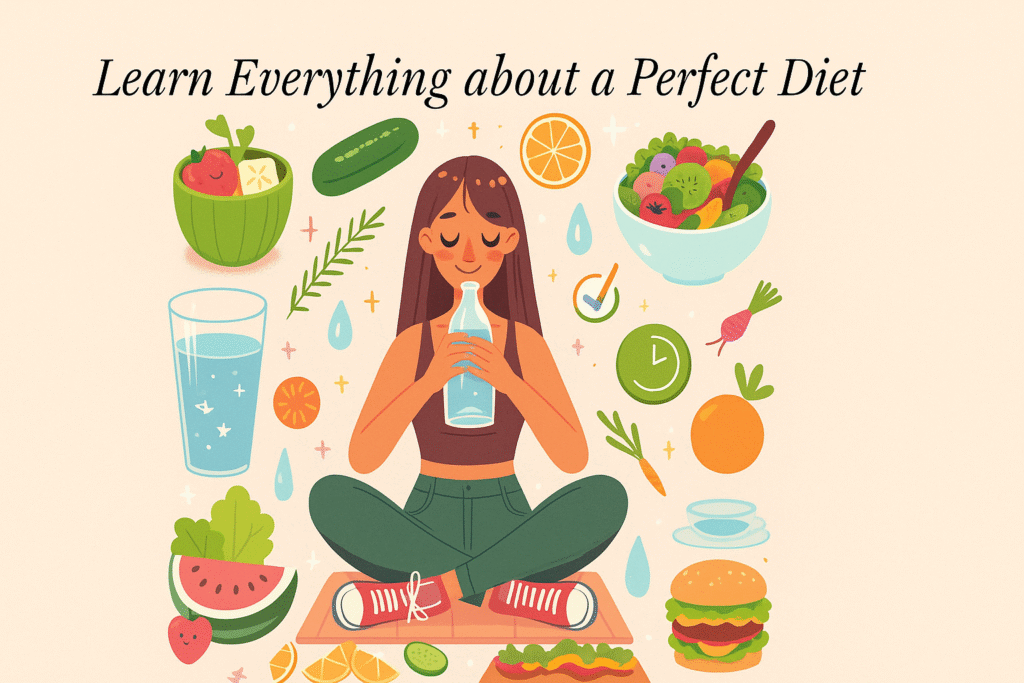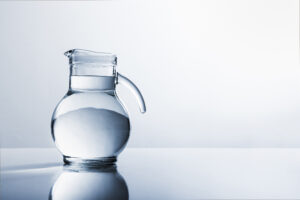Diet is everything an individual consumes. Be it healthy eating habits like veggies, ‘or i-always-eat-out’ kind of intake. Your diet determines your body weight composition, how fast your tissues heal, metabolism rate, immunity, and hormonal fluctuations.
Dieting has long been associated with losing weight by starving and cutting out on food by people. But it carries a deeper meaning, it tells about health, immunity, nutrition , calorie intake and further more.
Dietician. Poonam Sagar (DTPS) says, “I hear people say that they cannot eat because they are on diet, some of them starve themselves to the extent- they faint, and ends up in hospital”, DTPS continues, “This is not diet, it’s pure torture, and instead of resulting in weight loss, this can cause long term loss to the body which people seriously need to register in their mind”.
Diet- Definition, Type, & Misconceptions
Diet is not what you eat in a meal, in a day, or a week that forms a healthy diet. It’s what you consume consistently.
“Eating pizza once if you regularly eat healthy and nutritious food won’t ruin your diet, and eating healthy once won’t fix your diet in a blink of an eye.” says DTPS. Diet is more than just ‘wanting to lose weight’ but nutrition that your body need to function.
According to Harvard Healthy Eating Plate, A healthy meal is balanced with proteins for repair, complex carbs for energy, healthy fats for hormones, and fiber for digestion. Add colorful fruits and veggies for vitamins and minerals, and hydrate with water or buttermilk. Think of it as half plate veggies, quarter protein, quarter carbs, plus good fats.
If you want to simplify it, your diet is the long-term story of your food habits. It’s not about one bad meal or one good salad; it’s the consistent choices that shape your health, weight, mood, and even how your body ages.
Types of Diet
Popular beliefs compartmentalize diet into 5 major types and someone wanting to bag a desirable goal can make shifts in their eating habits. What you eat forms your diet, by changing what you eat- you can aim for specific requirements of your body and fulfill them rightfully.
- Balanced Diet – A mix of carbs, proteins, fats, vitamins, and minerals in the right proportion.
- Popular Weight-Loss Diets – Keto, Paleo, Intermittent Fasting, Low-Carb (each with pros and cons).
- Plant-Based Diets – Vegetarian, vegan, and flexitarian diets that reduce or eliminate animal products.
- Medical/Condition-Specific Diets – Diabetic diet, DASH (for blood pressure), gluten-free, heart-healthy.
- Cultural/Traditional Diets – Mediterranean, Ayurvedic-inspired, and other region-based food patterns.
Common Misconceptions About Diet
When it comes to diet, myths spread faster than facts like the TicToc treatemnt for migraine was to eat coca cola and fries together, by glorifying starvation, people often follow fads that do more harm than good. DTPS explains that a healthy diet isn’t about extremes but balance, variety, and sustainability.
- Diet = Starvation. Reality: a true diet should fuel your body, not deprive it.
- Carbs are evil. Complex carbs like whole grains and fruits are your body’s main energy source.
- Fat makes you fat. Healthy fats (nuts, seeds, olive oil) actually balance hormones and support the brain.
- Supplements can replace meals. No pill can replicate the synergy of whole foods.
- One-size-fits-all. Diet needs depend on age, gender, lifestyle, and medical conditions.
Why Your Diet Matters
Your diet decides much more than your weight. It affects all your organs, their functionality, your BMI, blood count, literally everything. some of these are,
- Energy Levels: What you eat fuels your productivity throughout the day.
- Immunity & Recovery: Nutrient-rich foods help you fight infections and heal faster.
- Mental Health: Omega-3s, B vitamins, and balanced nutrition improve mood and reduce brain fog.
- Long-Term Health: Good diet habits lower risks of diabetes, hypertension, obesity, and heart disease.
Components of a Healthy Diet
A healthy diet balances all essential components your body needs. Macronutrients like proteins, carbs, and fats provide energy and repair functions. “Micronutrients like vitamins, minerals, antioxidants boost immunity and cellular health. Hydration supports metabolism, while fiber aids digestion, gut health, and satiety”- says DTPS, everything has it’s purpose and not even one can be forsaken.
1. Macronutrients: Proteins, Carbs, Fats
Macronutrients are the foundation of your diet. Proteins repair tissues and build muscles, carbohydrates fuel your daily activities, and fats support hormones and brain function. “Don’t demonize carbs or fats,” says DTPS. A balanced intake ensures sustained energy, better recovery, and long-term health.
2. Micronutrients: Vitamins, Minerals, Antioxidants
Micronutrients may be required in small amounts but play massive roles. Vitamins and minerals regulate immunity, bone strength, and nerve function, while antioxidants protect cells from damage. DTPS emphasizes, “Micronutrients work silently, but their absence screams through fatigue, weak immunity, or brittle bones. local fruits, nuts, seeds, and greens give you everything if you eat variety.” Without them, fatigue, poor immunity, and slow healing can creep in.
3. Hydration: Water & Fluids
Water is more than thirst-quencher, it aids digestion, regulates body temperature, transports nutrients, and flushes toxins. Dehydration often shows up as headaches, fatigue, or sluggish metabolism. “Most of the time, when people feel tired or get headaches, it’s not hunger—it’s dehydration,” DTPS explains. Everything else is a add-on.
4. Role of Fiber
Dietary fiber, found in whole grains, fruits, and vegetables, is essential for digestive health. “Fiber is your gut’s best friend,” DTPS advises. It keeps bowel movements regular, supports gut bacteria, and promotes fullness. High-fiber diets also reduce risks of diabetes, obesity, and heart disease.
Practical Tips for a Sustainable Diet-
Eating healthy isn’t about salads-only or banning your favorite foods. A sustainable diet is flexible, enjoyable, and realistic to follow for life. DTPS highlights that consistency, balance, hydration, and variety matter far more than extreme restrictions.
- Follow the 80/20 rule – 80% nourishing foods, 20% treats.
- Practice portion control, not food elimination.
- Stay hydrated – water is as crucial as food.
- Choose variety – eat the rainbow (different colored fruits and veggies).
- Don’t skip meals, and don’t punish yourself for enjoying food.
Conclusion–
Diet is not punishment, nor is it a quick-fix trend. It’s your body’s daily language of nourishment, recovery, and strength. As DTPS says, “Diet is not about restriction, it’s about balance.” The right diet doesn’t just help you lose or gain weight — it builds resilience, supports your immunity, and ensures your body functions at its best.
Bibliography:
- Zohoori FV. Chapter 1: Nutrition and Diet. Monogr Oral Sci. 2020;28:1-13. doi: 10.1159/000455365. Epub 2019 Nov 7. PMID: 31940634.
- Cena H, Calder PC. Defining a Healthy Diet: Evidence for The Role of Contemporary Dietary Patterns in Health and Disease. Nutrients. 2020 Jan 27;12(2):334. doi: 10.3390/nu12020334. PMID: 32012681; PMCID: PMC7071223.
- Venn BJ. Macronutrients and Human Health for the 21st Century. Nutrients. 2020 Aug 7;12(8):2363. doi: 10.3390/nu12082363. PMID: 32784664; PMCID: PMC7468865.
- Shenkin A. Micronutrients in health and disease. Postgrad Med J. 2006 Sep;82(971):559-67. doi: 10.1136/pgmj.2006.047670. PMID: 16954450; PMCID: PMC2585731.
- Popkin BM, D’Anci KE, Rosenberg IH. Water, hydration, and health. Nutr Rev. 2010 Aug;68(8):439-58. doi: 10.1111/j.1753-4887.2010.00304.x. PMID: 20646222; PMCID: PMC2908954.
- Dhingra D, Michael M, Rajput H, Patil RT. Dietary fibre in foods: a review. J Food Sci Technol. 2012 Jun;49(3):255-66. doi: 10.1007/s13197-011-0365-5. Epub 2011 Apr 12. PMID: 23729846; PMCID: PMC3614039.
- Wu G. Dietary protein intake and human health. Food Funct. 2016 Mar;7(3):1251-65. doi: 10.1039/c5fo01530h. PMID: 26797090.
- Slavin J, Carlson J. Carbohydrates. Adv Nutr. 2014 Nov 14;5(6):760-1. doi: 10.3945/an.114.006163. PMID: 25398736; PMCID: PMC4224210.







